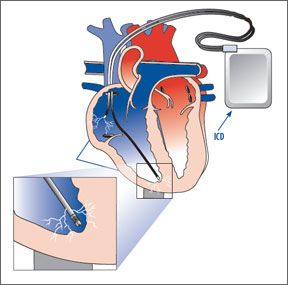In the past, implantable cardioverter defibrillators (ICDs) were often considered a life-saving device that kept patients alive, but limited their quality of life. Todays improved ICDs are a whole new story. Designed to quickly detect a life-threatening, rapid heartbeat and shock it back to normalcy, these tiny devices permit patients to lead active lives on a par with their healthy peers, according to a study in the April 2007 issue of Pacing and Clinical Electrophysiology. "Patients with defibrillators are able to maintain active lives, often including driving, golfing, travelling, and hiking alone in the woods, without being afraid that they arent adequately protected," says Bruce L. Wilkoff, MD, director of Cardiac Pacing & Tachyarrhythmia Devices in the Department of Cardiovascular Medicine at Cleveland Clinic.
To continue reading this article or issue you must be a paid subscriber.
Sign in






